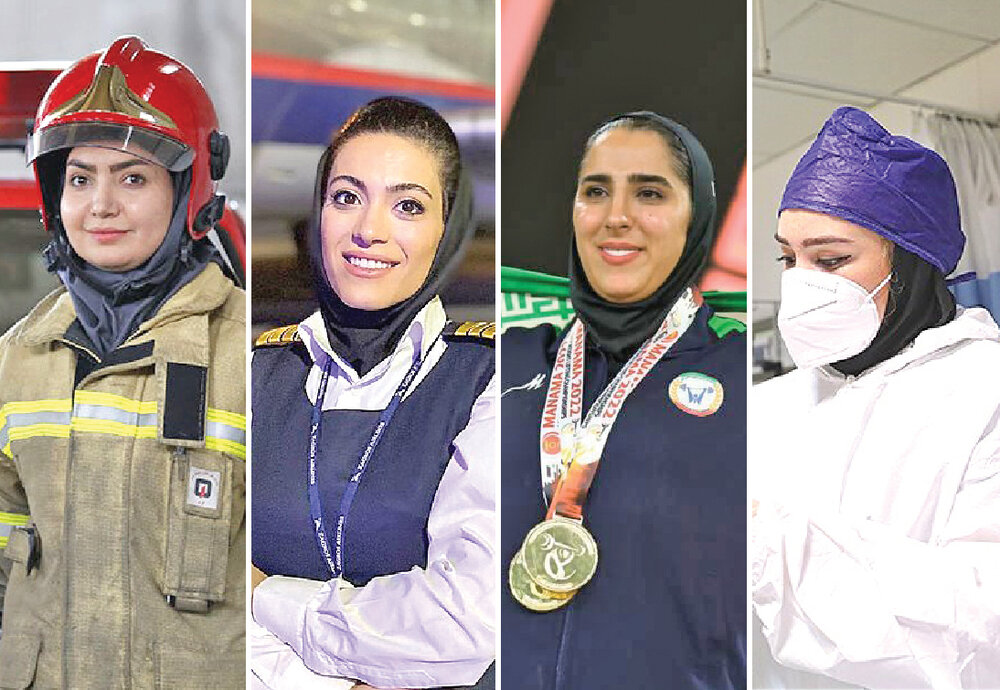Achievements of women after the Islamic Revolution

TEHRAN – The Vice Presidency for Women's Affairs released a report on the achievements of women after the 1979 Islamic Revolution in 7 areas of “education”, “health”, “employment and entrepreneurship”, “media”, “sports”, “decision-making”, and “environment, climate, and crises”.
In the field of education, the share of women in university faculty members has increased by 33.3 percent, and in medical sciences universities by 34 percent. Also, the number of female students in the country's universities has increased by 56 percent, according to the report.
Also, illiteracy among women and girls has been nearly eradicated as the literacy rate reached 99.3 percent and the ratio of female to male students has increased by 28 percent.
The report also says that after the Islamic Revolution until the past Iranian calendar year (March 2021-March 2022), more than 9,500 female authors and 840 female publishers were active in the country.
More than 95 percent of births were performed by obstetricians and gynecologists. For every 100,000 women in the country, there are 60 midwives and 2.8 obstetricians.
Also, the implementation of the universal health coverage network for 100 percent of urban residents and 99 percent of villagers and nomads, ranking tenth in the world in terms of the lowest rate of death from the cervix, reducing the death rate of children under 5 years by 2.14 percent per 100,000 births, and reducing the infant mortality rate to 2.8 percent per 100,000 births are among the achievements and advances of women field after the Islamic Revolution, based on the report.
In the field of employment and entrepreneurship, 4,200 rural women's credit funds have been operating. Also, 2,390 women work as members of the board of directors of knowledge-based companies.
Social security insurance coverage for female heads of households, reducing the unemployment rate of women to 13.7 percent, female employers to 1.2 percent of working women, sustainable business development, increasing women's access to natural resources, and implementing the national employment empowerment plan with a focus on women, villagers, and nomads are other achievements of the Islamic republic in four decades.
According to this report, there are 16,111 sports clubs for women in the country, and 3,302 medals have been won by female athletes in recent world events.
Illiteracy among women and girls has been nearly eradicated as the literacy rate reached 99.3 percent.
Moreover, 70 women have been presidents of sports committees at the provincial level, and 51 women have been presidents and heads of sports federations. Also, 88,366 women referees have participated in national and international competitions, and Iranian women have worked in 97 international seats in world sports federations.
In the field of media, the participation rate of women in the field of information technology has reached 5.31 percent, 903 women filmmakers have worked in the field of cinema and 2000 women specialists have worked behind the scenes.
Also, 114 national awards and 128 international awards have been won by female filmmakers in prominent festivals.
In the field of power and decision-making, 25.2 percent of the country's government managers are women at all levels of high, middle, and basic executive management; 1,121 female judges are working in the country, women volunteering to represent the parliament faced a growth of 227 percent, increasing the participation rate of women in the parliament to 59.5 percent are also other achievements of women after the Islamic revolution.
Women have also made significant progress in the field of environment, climate, and crises. As some 40 percent of the positions of deputy heads of the Department of Environment were for women.
Providing basic needs for 20,912 women in the earthquake-affected areas last year and paying subsistence allowances to 299,120 women affected by climate crises are other important measures in the field of women, the report stated.
History has shown that Iranian diligent women have long been taking steps in the tortuous path of development. So, their significant role in the aforementioned achievements should be praised.
Women empowerment
The Welfare Organization will create up to 10,000 jobs to empower women heads of households, Mohammad Nasiri, the deputy head of the organization for cultural and social affairs, said in April.
A total budget of 3 trillion rials (nearly $11.5 million) has been earmarked for empowering these women with the approach of home employment, he explained.
According to the Statistical Center of Iran, out of twenty-two (22) million families in Iran, over three (3) million are WHH and most of them are in less-developed areas. The Government prioritized such families for targeting socio-economic support.
Meanwhile, Zahra Ershadi, Iran's ambassador and deputy representative to the United Nations, has said that Iran has made significant progress in empowering women, despite U.S. illegal and inhumane sanctions.
Ensieh Khazali, the vice president for women and family affairs, said in the 66th session of the Commission on the Status of Women, that about 12,000 female heads of households underwent empowerment training and entered the traditional and virtual market.
Also, more than 1.1 million women heads of households are covered by the Relief Committee and more than 300,000 are covered by the Welfare Organization, benefiting from special support such as facilities, insurance, and livelihood services.
FB/MG
